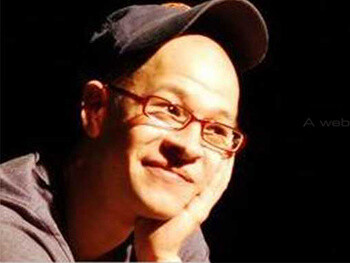Bobbing in the Sea of Sunk Cost
If you are thinking of getting an MFA and are fortunate enough to be accepted, don’t go.
I write this presuming you have to pay for the degree somehow. I write this also acknowledging that I would not have my current life if I hadn’t gotten an MFA. Mine is from Columbia’s School of the Arts in the noble field of playwriting. Without that opportunity, I wouldn’t have met a countless number of the best friends I have. I wouldn’t have found my way into numerous communities that helped me grow into a more confident, emotionally attentive, better fulfilled person. I wouldn’t have multiple produced plays or have collaborated in Holland with a director I met at Columbia, or have done anything in theater at all. It's likely I wouldn’t have ever finished a play, period. I wouldn’t have a family-friend-impressing television-writing job (The Simpsons, Sundays on Fox— sellout!). I wouldn’t be who I am, and it’s very possible I’d be a much worse person. Maybe I would’ve found another way not to be a complete waste of cognitive function. But the way I found it originated with an MFA. So credit, due, etc.
That boastful junk aside, I repeat: Don’t go.
An MFA cannot guarantee talent or success. All it can guarantee (presuming you’re paying for it) is a massive financial obligation, possibly one that yokes you to exhausting debt for too long a time, in service of a degree that has a terrible cost to future-expected-earnings ratio. Look up studies on the cost/benefit relationship of graduate degrees. MFA degrees are pretty much shat on by all of them. I know many talented, successful playwrights that don’t have an MFA. I know many talented, successful TV writers that don’t have an MFA. Better to save your money or invest it wisely, and keep doing the art you want to do. It’s a smarter way to play the percentages.
An MFA cannot guarantee talent or success. All it can guarantee (presuming you’re paying for it) is a massive financial obligation, possibly one that yokes you to exhausting debt for too long a time, in service of a degree that has a terrible cost to future-expected-earnings ratio.
So why did I get an MFA, one may fairly ask? My primary reason wasn’t very noble or artistic. I wanted to answer the question, “What are you doing?” in a way that didn’t ramble and vanish into an ellipsis. I’m upper middle class, so saying “I’m getting an MFA” could actually answer that question for friends in my peer group and extended family. I found that after my MFA was over, my uncle returned to his previous skepticism.
Of the MFA programs I applied to, I got into exactly one: Columbia University for Playwriting, off the waitlist, the second year I applied to programs. I didn’t have a lot of options. I hadn’t done much theater. I had little idea what I wanted out of my writing other than it being “good.” The play I submitted both years was incomplete. I suspect the primary reason I got in is that people in charge of Columbia’s admissions knew my parents could cover the insane tuition (they did). Whatever the reason, I was Indiana Jones’s hat snatched from under the stone temple door.
I had wanted to be a writer as a kid. Who doesn’t want to make stuff up for a living? Many folks are in the make ‘em up trades: derivative bundlers, Pharma reps, sports analysts, and far too many accountants. Writers, however, are a more respected breed. Theater is associated with some of my favorite memories. It also, in my opinion, offers the most potent spine tingle (Nabokov paraphrase) for a consumer of writing, if done truly well. And I also felt I needed to be a part of a collaborative system to pull myself from an innate tendency toward social alienation. Theater was, in these ways, the likeliest written form to be fun.
As an aimless guy in my twenties who could hear loneliness calling since early childhood, I desperately wanted to experience fun. That I might be able to have fun while still answering, “What are you doing with your life?” seemed to satisfy both the stoic and the epicurean. That seemed as close to a win-win as I was going to get at the time.
Maybe you’ve read this far and I still haven’t completely discouraged you from getting an MFA (I applaud the dogged attitude). All right. Here's some advice on maximizing the utility in getting one.
- Accept that tuition is a sunk cost. Whatever you get for it, that money is gone. Don’t hold on to it imagining it should buy you secret knowledge, keys to open doors, a fix on how to “make it,” a hot lunch, or a feeling of self-respect.
Hopefully, you are shrewder than this guy, and you research teaching styles, artistic missions, and the types of voices previously nurtured by the faculty at the schools you apply to. Then you might be able to select for the program that will best serve to foster your development. If you think you’re not in that program, however, don’t let frustration cloud over the benefits that remain. Entitlement is only ever an impediment.
- Take every moment as a chance to grow. Even if you suspect everything is a stupid waste of time, focus on trying to do the least stupid version possible of that waste of time.
- Don’t concern yourself with trying to impress anyone at school. They won’t decide your future. Your work will decide your future.
- Be open to everyone you’re in school with. The time for judgment will come. Artistic difference, personality clashes, and simpatico visions are all opportunities to expand your tools and test your assumptions.
- Develop a critical understanding of writing, using clear, straightforward language.
- You are ultimately paying for time to devote to your work, so work. Throw yourself into projects. Make up projects if you don’t think enough are offered to you. Try stuff you think might fail. Try stuff you feel confident will be awesome. School will likely provide access to willing audiences. Classmates are good for curiosity. Use each and every resource offered, and hustle for those that aren’t. Whatever allows you to do the work.
- Have fun. Why are you paying a highly profitable institution to give you permission do art, be a part of the artistic process, if you’re not having any fun?
Once you have an MFA, put it on resumes and then forget about it. (Sunk cost).
I grew more as a writer after I graduated. The first production I ever did outside of school, in a small New York festival a few months after graduation, made me hate theater. By fall, as no class schedule was sent to me, the obvious thought finally hit me: I just spent a ton of my parents’ money and I ought to do my damnedest to show something for their investment. I got less whiney about self-promotion (although I remain whiney). I sought out community instead of expecting it to find me. I prioritized writing over a social life. I continued to view the world as an institution devoted to learning because I was certain I was still clueless.
Note: you do not need an MFA to know or do any of this.
When you are done with your MFA, you will be back to where you were before you started, hopefully a little sharper, likely a hell of a lot poorer. And that’s okay.
An MFA is neither an end nor a beginning. How it will fit into the narrative of your life is a question for your future self, and last I heard that person isn’t speaking to you. What the present can offer is the work, waiting, calling—the work with all its challenges, rewards, humiliations, joys, hot lunches, cold lunches, no lunches, pretentions, and insights—no matter the money made or the debt owed. And if your answers to questions of purpose end in ellipses, just put that into your scripts. If you can convince the world that’s how people talk, it may make the practice seem more acceptable.











Comments
The article is just the start of the conversation—we want to know what you think about this subject, too! HowlRound is a space for knowledge-sharing, and we welcome spirited, thoughtful, and on-topic dialogue. Find our full comments policy here
I am an MFA student in a low residency program. I have to make the decision every summer to leave my family in the Midwest to come east and study. And the truth is I would not have the voice I do now if it weren't for my MFA program. I do think that the saying "you can't teach someone to be a good writer" has some validity. But I do believe you can teach subtly, technique, and explore process. I went through some awkward phases transitioning from fiction writer to playwright. And I explored those phases under the guidance of working professionals. I could have stumbled and tried to grow on my own, but I would have no litmus to how I was advancing without this collective of artists I'm surrounded by. I'm not only being taught how to develop my writing, I'm learning how to start a theatre company. I'm learning how to bring drama/performance art to special populations. I'm being taught the history of queer theatre by people who wrote and performed at Caffe Cino. I learned what experimental theatre could be by someone who just got a rave review by the New York Times for their new show, validating everything they taught us. And guess what? I'm in one of the least expensive programs in the country, and I had never written a full length play before I had gotten here and was certainly not "getting attention".
I would never put my MFA degree on my resume and forget about it.
Maybe you were lucky enough to realize that you could do everything without an MFA program.
Maybe you weren't lucky enough to be inside a rewarding program.
I like going to HowlRound and being able to be able to tap in to the current conversation on what is going on around this country in regards to theatre. But the quarterly "my MFA was a waste" blog is something I need to try to avoid. Or maybe I'm just missing the "my MFA was not a waste" blog.
(just adding through an edit, I'm glad you acknowledge you were given several opportunities from your MFA program, but you invalidate all that by saying to others "don't go". It leads me to believe you wish you hadn't gone.)
Hi Taylor, your thoughts may have long floated out of memory, but i just read them. Please do not confuse "Don't go" with "it was a waste." The whole second paragraph is a long list of how my MFA wasn't a waste. "Don't go" is to encourage others to take on the challenge of growing as an artist without the structure of an MFA program, largely for the pragmatic reason of cost. But also because I've had friends without MFAs tell me they feel like they'll never rise above a certainly level since they lack that MFA imprimatur. And I want to make clear that is really not true. I gained a tremendous amount from my program, but I also grew most as an artist away from the program. It's terrific to read how much you've gained from you low-cost program [shrewd move], and I give you credit for the effort you're placing on your education and how rich you've made the experience. To do so is never just on the program, and it's knowing that that allows a person to maximize his/her time in one. Personally, i think there's something to said for overcoming discouragement [and in that way, something to be said for discouragement itself], since much of being a writer is exactly that. The irony and ambivalence in such an idea was what i had hoped to get across. Best of luck. I hope you keep discovering rewarding experiences.
Jon, I think my response was out of frustration that I seem to see a lot of articles on the internet right now about why an MFA is unnecessary, and that I hear in the office of the college I work at, "I'm never hiring hiring anyone with an MFA again, they are too much trouble." I was really just trying to represent the other side of the coin, listing that an MFA might be the perfect place to hang out for a while. I make my own way, and I would've found a way to be involved with theatre/film/television regardless of being in my MFA program, but I had a huge issue with understanding story structure that I wasn't going to solve on my own. I do believe some MFA programs don't take risk and only accept people who have already mastered the art of playwrighting (or whatever area of artistic creativity) and then just expect them to keep pumping out good work while the University claims the artist. I can understand artists/writers getting a bit perturbed by that.
I can't imagine spending all that money on a degree that you ultimately think was unneeded. That's a bummer. And I don't think anyone who doesn't know what they need out of an MFA program to go into one. If they don't fully recognize what they need to work on and can get out of an educational setting, they'll be disappointed. But I think there's a lot of writers out there who will be just like you, and become way better writers after they graduate (I hope to do the same), but I do believe there is a level of foundational education (even in the graduate level) that some can't get elsewhere and the networking is way easier in an MFA program.
Would I have a better resume if I would have just sunk these costs into self-producing, or producing others, and getting about 2-3 theatre seasons out of it? Maybe, but that's just a big of a risk. Could I have travelled? Yes. But who cares if I traveled? At least at the end of all this I have a degree and that's what other people care about. And I know that's the problem you're bringing up in the article, but we've gone down this rabbit hole so far, that can't see any other healthy alternative. Hiring managers have a bench mark with that degree to base you on. And right now, my degree will get me further than someone without one. My big question to you is, how is that "sunk cost" and not an investment?
In the grand picture, I agree with you and I totally see where you're coming from. I get it. But I'm in the camp that finds a bit of security and pride out of my degree.
Thanks for the good article and great discussion!
I agree. I also have an MFA and now teach in an MFA program. My decision to get an MFA came at the expense of some very solid opportunities with a really amazing and impactful theatre. I remember being on a Bus, leaving the city I was working in, I got a call from my supervisor saying that if I changed my mind, there would be a place for me there. Co-workers and friends said just to work and not go into debt... but I went anyway.
I especially appreciate your 7 points about what to do if you go anyway, cause there I agree even more. I had a number of classmates downright pissed off in their first of three years of graduate school because they didn't know what they were supposed to do.
I went to graduate school because I really wanted the open space. I realized I was paying someone else to allow me three years of doing whatever I wanted to develop as an artist. I'm glad I did it too. I think I evolved more than I would have in the LX department of the theatre I was working for before I left... though I did get to work on awesome stuff in an awesome place there to.
I did two programs (one in management and another in design) concurrently and finished a year earlier than I had initially agreed... which is to say after the same 3 years as most people. And I slept very little and constantly was working on things because when would I next have the freedom to develop my own work and figure out what I wanted to do. I was looking to fail big and not risk ruining my career. I could make big, pretentious, ambitious choices and not have to leave the industry if they didn't work. That seemed expensive, but I justified it.
Now, I cherish this time. My wife, who I met right before grad school, but was already going to the same school, sometimes questions he choice, but I remain steadfastly confident in my decision.
But I still think people should not to grad school and get an MFA. It's a stupid move in any logical sense.
Maybe I've come to think that only if you are so determined to go and it's for some clear reason OR reason which look like they can become clear to develop and really exploit the freedom that it can afford you that you wouldn't reconsider going no matter what I or you (Jon, author of this post) say, then okay... we're not going to stop you... do what you want and waste your money... then it might one day be proven to have been a good or at least not a bad decision.
So maybe I wouldn't say "Don't get an MFA", but would rather say " Only get an MFA if you're able to irrationally deny all reasonable decision making to serve your Ego and potential development as an artist." But every acknowledge there is a condition under which it might be justifiable probably means that I should still to "Don't get an MFA"
Thanks, Ian. Yeah, I went with pithy and attention grabbing over complete precision with that statement. I hoped the precision would come across in the rest of the read. Overcoming naysayers is part of the path toward making the life you want. I am happy to have my nays overcome. I'm glad to hear you feel like the path you traveled was the best one for you.
Full disclosure, I run an MFA program in playwriting, so feel free to immediately discount my comment as coming from the self-interested folks you are attacking in your article, but it seems to me that when you yourself have an MFA, admit it provided benefits, and acknowledge that institutional theatres use an MFA as some indication that you have training and have collaborated and therefore the door might open just a bit where it might not for someone who is self-instructed... it feels a little like you're pulling the ladder up behind you. Now, I know that isn't what you're doing, but I feel like I have to point out that it could seem that way. Perhaps instead of condemning all MFA playwriting programs with the same broad brush and telling people they should not pursue training or inclusion into a graduate program you should instead tell them to be highly selective and make sure that they are going to grad school for a reason that is of greater weight than "joining a club" or "meeting people" or to avoid paying on their undergraduate debt through the deferment program. I also don't think anyone should go into an arts program treating it like a vocational program and using only market value to determine a cost benefit. But, like I said, I'm self-interested. I'd kick the tires, and I'd ask a lot of questions, and I'd talk to the students already in the program before I started it. Well, I would now, when I got my MFA I was recruited with a full tuition scholarship. If you have to pay, know what you're paying for, and then decide--just like you would (or should) do before you submit to a contest or theatre with a hefty reader's fee. And if the school should ask you questions like, "What are your artistic and professional goals and how do you see your participation in this program helping you attain them?" If they don't ask, they don't care and aren't going to help craft a plan of study with you to get you there. I'd also ask how they track and continue to support their graduates after they stop paying tuition. If they don't know what most of their graduates are doing, and only track the big shots who are being used in their advertising, that's another flag. I share a lot of your skepticism about traditional graduate programs--that's why when I designed the one I run (you can search for it, I don't want to be accused of responding only to attract students) I tried to make it as different from everything I didn't like about my program as I could and yet beef up everything that I loved about where I went to school to get my degree. We aren't a degree mill, we don't want you in our program if you think we're ripping you off and we ask what kind of training you want and who do you think would best provide that training. We can't afford everyone we like, but the people we have brought in (and there are a lot of them) have nearly universally praised our program for being an antidote for the kind of thing you're decrying. I wish we had more money to put toward scholarships, but alas, we are apparently not one of the "highly profitable" institutions you describe. Still, I think we give good value for the dollar, and I'd encourage you to check us out, ask some of the people who have come to our program as guests and faculty, but really, the people you need to talk to are our students. I don't think their enthusiasm for our program is the result of brainwashing or a pyramid scheme to disguise buyer's remorse. Our playwrights want to be here and we're busting our balls to make sure they think coming here was worth their investment of time, money, and energy. Also, our students are really amazing at putting into immediate practical use everything they are learning, rather than sitting around waiting to be discovered or let into some mythical professional world because they are being tricked into thinking their degree is some kind of key. We focus on learning stuff, and then using what we learned to do stuff. But, like I said, don't take my word for it. Ask one of our students, or all of them. I'm really not afraid of the answer.
Hi Todd, I too trust your students love your MFA program. If anyone felt I was pulling up a ladder after myself, I'd say it's the idea that there is a ladder at all that's the problem. Many accidents and choices go into making the winding road of a life, and while getting proved helpful to me, it cannot make that promise to all. Nor does it need to. But the more a prospective MFAer knows there is no promise, the better he/she can apply themselves to that actual work of learning and building the life they want. That you said that you "know" that wasn't what I was doing makes me believe this point was clear in the piece. I wrote this in a non-deferential way, complete with contradictions my own life poses to my argument. That was to show there is no straight line argument for one's choices. That you and the rest of your faculty want to prove to the "Don't Go" statement is wrong is honestly what I would want to hear from any MFA instructor. if anyone tells me they're considering an MFA, I'll make sure to recommend they look you up.
I think the MFA has been incredibly beneficial to me -- but I went in knowing that I was going just for my own edification, and to actually put some tools in my toolbox. I started writing late in life (never finished college) and though I had some success with my first plays, I reached a point where I knew I had no writing language, no clues on the very basics not just of writing but of the writing life. I needed school, and found a low-residency MFA program that was a perfect fit for me. I started the program when I turned 45, finished at 48 with an MFA and, yes, debt. But I think what I learned about being a writer, and more importantly what I learned about myself, has been invaluable. Before, when someone would ask me what I did, I would say, "well, I work in the pharmaceutical industry, but at night, I'm a playwright." Now, when someone asks me what I do, I say, "I'm a writer." Period. And I don't think I would have gotten that without school.
Nancy - I understand your frustration and have felt it myself. But eventually I had to let go of those feelings. What has helped me is to remember the playwrights without MFAs that are loved and respected thoughout the field - people like Branden-Jacobs Jenkins, Lucy Thurber, Tracey Scott Wilson, Matthew Lopez, Mando Alvarado, Will Power, Dael Orlandersmith, Lydia Diamond, Marisa Wegrzyn, Radha Blank, Dominique Morisseau, Mia McCollough., and Mona Mansour (i think).. And I'm sure there's more. And if they did it - then that means it can be done. Instead of obsessing over not having an MFA - I decided to spend time studying the careers of those who took a different path. I can create a new narrative. Create my own model.
These days it is difficult to get past the theater company gatekeepers without an MFA. And there's so many MFA graduates now, esp in the last 10 years, it's like an industry -- every university in the US now it seems mints tons of new MFAs (there's a lot of playwrights who need work teaching playwriting because so few new plays are actually produced these days -- playwrights have to teach to eat) In what year did you get your MFA? I'm guessing (by your photo) that it was quite a while ago. I feel now that without an MFA theater is pretty much a closed door. I've started writing screenplays where the quality of the writing and the story you're telling is what matters - and there's plenty more readers for screenplays. I've found some success there -- it's a far more democratic world it seems. My heart will always be with theater, but I'm falling in love with my new love too, I have stories to tell! But then, I have all these plays, some produced and some not which will never see the light of day because I don't have an MFA and can't get past the theater doors...sigh.
MFA or not, don't worry about getting past theatre company's doors. You can't be a theatre creator today without self producing. If you're not willing to put your all and your neck on the line for a piece you're creating, why should a theatre company that may have as much as 1-2 million dollars on the line with any one production. Don't wait for the theatre companies or the MFA programs. Make art on your own!